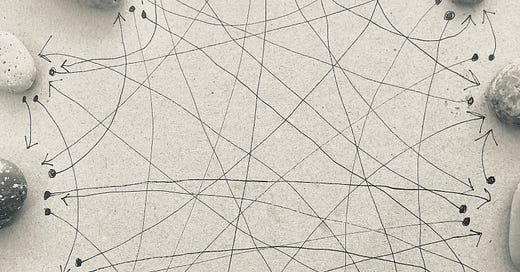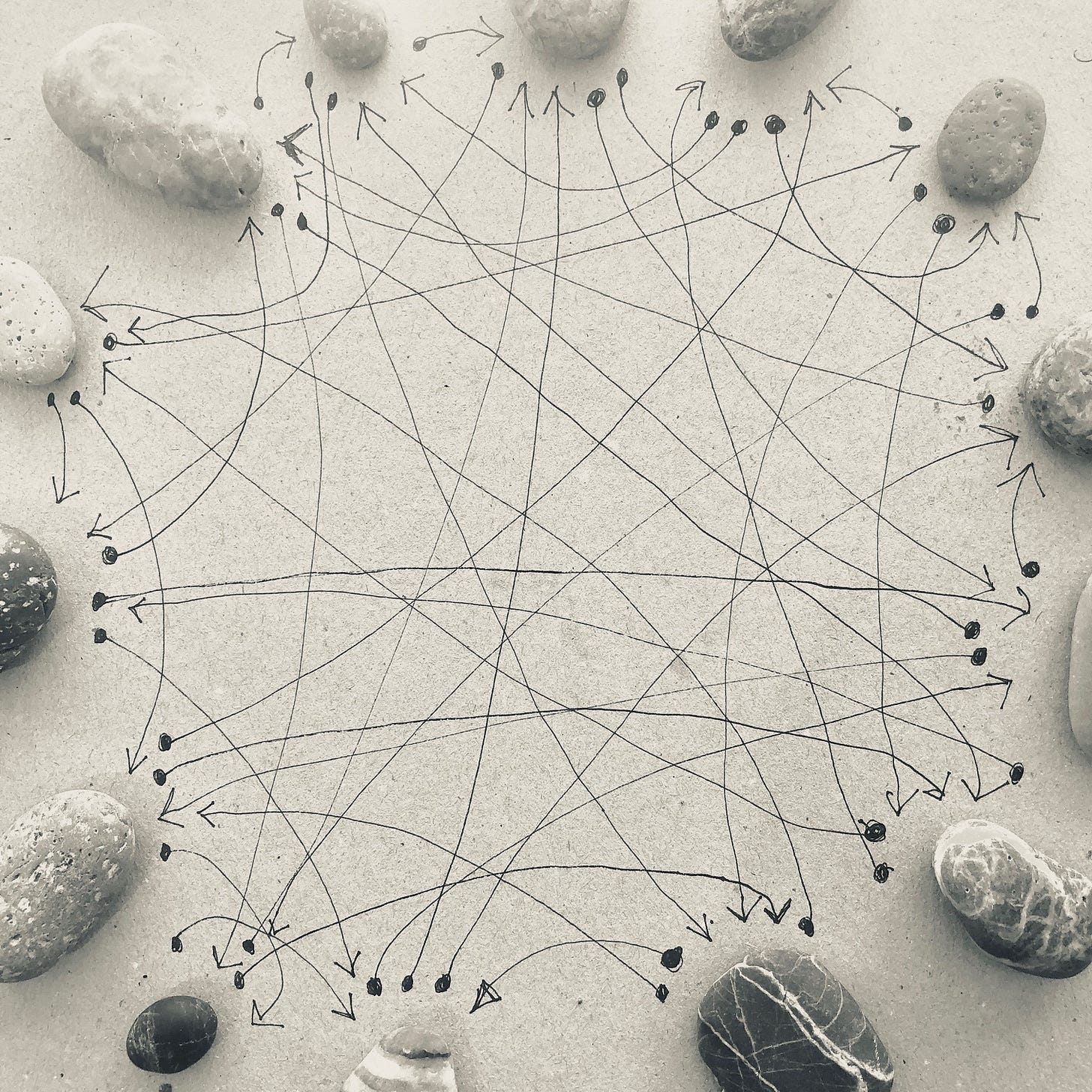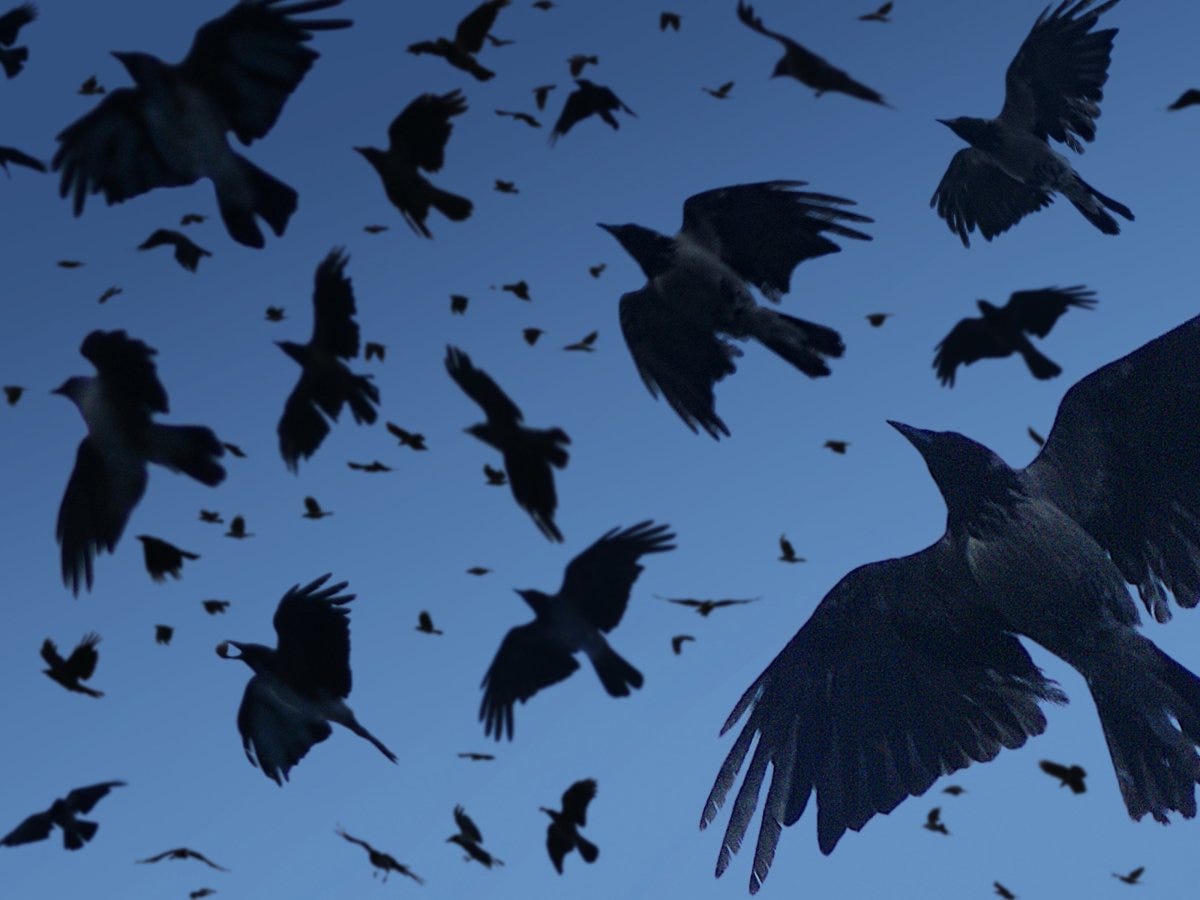Crows…
As I am writing, I’m watching the crows outside my back window building their nests. Every year, as February turns to March here in West Wales, they scout out their places in the trees that line our hamlet. Within days there are around twenty nests being constructed and crows flying everywhere with twigs in their beaks. This time of year, towards the end of the day, they also gather – a couple of hundred of them – for their community fly-past. That sounds as if we, the human watchers, are somehow part of this, but we are not, of course. We are just lucky to be able to live here and witness their lives as they cycle from one year to the next.
We humans have our cycles too. Some are seasonal, some are annual. Some of them are sustained and some broken. The world is not as predictable as we like to hope. We sometime adapt, however, to changes that come our way. The crows too. A few years ago, a whole line of trees, nearer to the houses were taken down, and that was where the crows had built their homes before. The next year, they simply upped sticks (literally) and moved a dozen yards back across the lane, and now they seem like they’ve always been there.
Why am I writing about crows? Well they’re in my life, and they’re in the local ecology of the world I live in. I like observing their rhythms, cycles and day-to-day lives. They – building in the trees – keep me grounded here. And they remind me that change is inevitable and that adaption and mutual learning is what lifeforms do, even when things seem devastating. And that collaboration and cooperation is the natural way of the world. Ecology means this, depends upon it. The alternatives are what we see when human beings go rogue, or when life seems to rely on things staying the same.
Humans, going rogue…
Eleven years ago, Unpsychology Magazine was something new. It was responding to something in the world that, back then, was nascent, and is now erupting with a heedless fury. Back then, as it was becoming more and more obvious that the climate had reached its tipping point, we may have agreed with the adage from Richard Reese’s essay that “only the poets can save us now”.1 However, we also expected, I think, that there would be a collective leaning into the understanding that things needed to move and change. They have moved, of course, but ferociously, tragically, in the opposite direction.
Unpsychology grew. It changed. We learned from each other, from our growing community, how mind and art and science and creativity and culture and politics and relationship are all part of the same ‘warm data’ that offers us the information we need to live in the ‘mesh’ of ecological interdependence; even to live with the death throes of late stage capitalism.2 We had hope. In each other. In the work we were sharing. In the community that was building. In the rhythms and cycles of creation, curation and publication that the magazine had worked itself into.
And then, walls came tumbling down. With stark horror the downsides of global interdependence and complexity were starkly revealed (as if they weren’t known to many of us already). Though many people tried and are still trying to carry on as normal – as if the richest nation on Earth wasn’t imploding – the inevitable consequence of decades of transactional economics and cynical, inhuman, global politics is blowing up in our faces.
Unpsychology was always meant to respond to what we might call the ‘mind in the world’, but the world has changed so rapidly, so completely, in the space of just a few months, that what we respond to no longer seems clear.
In the spaces where people write and think (like Substack!) some of the optimistic ones still write at length about the meta-crisis and their ideas for solving it, where once they might have written about philosophy or complexity or eco-psychology. Others have turned – literally – to God. Where once they were – like many in the so-called progressive spaces – ‘spiritual seekers’, these people have made it their task to fill the “god-shaped hole” they imagine that all this chaos has left us with. One that has been created by the ‘materialist rationalism’ of modern culture. Others still have capitulated to the authoritarian oligarchs who have been unleashed, saying something to the effect of, “Yeah, Ok,nothing to see here. Just carry on…”.
It is, to put it succinctly, all a bit fucked up.
Ordinary things
I am writing for myself here, but I couldn’t in all honesty carry on pretending that everything was the same. Even in my own life, things have changed and I want to attend closely to these. I am getting older. I have recently retired from employed work. I have experienced the death of both my parents in the last few years. Ordinary things.
I also see trouble creeping into the lives of people I respect and love, as they, in turn, try to deal with systems, cultures and institutions built round old assumptions and purposes. Assumptions that pathologise the inability or unwillingness of ordinary people to take the brunt of the responsibility for adaption and change in a breaking world. Assumption that define the parameters of ‘normal’, so that ‘madness’, ‘neurodiversity’, ‘queerness’ and other experiences of diversity and difference are regarded as beyond the pale.
We live in the tangles, therefore, of systems too complex, judgemental and amoral to be properly sustainable.
Schools built for adults and outcomes not for children who, in their turn, find them increasingly impossible to thrive in. Workplaces steered by corporate visions that have nothing to do with the needs of the people they employ and serve. Companies that, when they produce anything at all apart from shareholder payback, produce ‘stuff’ that has no real value to ordinary humans. Services that are meant to serve people and places, but turn into more ‘things’ for markets to get their teeth into. It was ever thus, or has been since capitalism started to grow into its current twisted form.
And there are so many words out there. Responding. Coming up with endless ‘solutions’. We ‘must’ this. We ‘should’ that. ‘Let us make the change’ – though we never do. Expressing ‘outrage’ over and again. Analysing, endlessly. Obfuscating. Lying and deceiving. Overwhelming and overpowering. Drawing straight lines to this and that; from here to there…
So many words here too…
Something lies between us…
However, I and (for their own particular reasons) the other Unpsychology editors, wanted our words to be something a little more phenomenological and relational. We wanted to be responding to the here-and-now and the what-this-is. To be present with ordinary life and its small truths and moments of joy (and pain). In the way that two people in a room can communicate something shared and lovely with only a few words and gestures, we wanted this for ourselves, and for the Unpsychology project.
We didn’t – don’t – know where this might lead. This is the point of course. We’ve had it with aims and objectives, and if global things really do go arse-over-tit in days to come, the ‘aims’ for an increasing number of humans will be about survival. That sounds stark, but talk to the people in war and famine zones, or any of the places where ‘normal’ life has turned suddenly into a survival game.
Normal life, is what this is about. A space in which we talk and write to and with each other about small ideas and the things we humans do each day that keep us connected. The ways we are embedded in the ‘mesh’ or the ‘web’ or whatever metaphor for ecological sharing works best for us.
So, we have stepped away from the usual cycle of magazine production, therefore, and into different spaces and projects which will take us from here to wherever. Nubs, we’ve called them.
Three of them, one for each of the editors. Unpsychology is still about words and art and creativity, of course, because that is what is ‘everyday’ for us three, and the people who have decided they are committed enough to the uncertainty to engage with and co-create whatever is created.
It might be the messy wordplay in
’s Unpsychology Writer’s Playgroup – half a dozen writers willing to chuck paint at the walls – so to speak – and see what word patterns emerge… poetry, stories, ideas, combinations of these. Shared and honed and, at the very least, feeding, our imaginations…
It might the Lattice of Letters that
is weaving right now. Fourteen people willing to send and receive real paper letters to each others. To be ecological pen-pals. Fourteen pebbles connected across the world by the vagaries of our respective postal services – and our own creativity and willingness to share our feelings and thoughts with global strangers…
Or it might be the Small Forms Pamphlet nub that I (
) have conjured. In this one is a question. Can we return to small ideas and thoughts – as essay, poetry, art – that we collaborate on and send out into the world? We have so many words flying around right now, maybe a slim volume of shared reflection, thought and art might bring something rich, nourishing - even loving.
In all three, we are exploring the something that lies between us. It’s not mysterious - but it is. It’s not sacred - but it is. It’s not rational - but it is. It’s not something that can heal our broken world – but it can help us live with joy within it.
Or something…
Notes
Richard Reese’s essay, Only the Poets Can Save Us Now, was popular among deep ecology activists and some people around the Dark Mountain Project around 15 years or so ago. https://www.aislingmagazine.com/aislingmagazine/articles/TAM25/OnlyThePoets.html
Warm Data is Nora Bateson’s term for “Transcontextual information about the interrelationships that integrate a complex system.” The Mesh is Timothy Morton’s conception of the ecology of interdependent systems – living and otherwise. Find more in Nora Bateson’s book Combining from https://www.triarchypress.net/combining.html and Timothy Morton’s paper, The Mesh, at https://www.academia.edu/1046913/The_Mesh









Celebrating the changes as you stay true to what is right for you. <3